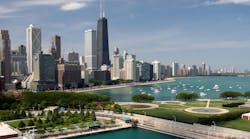As unseasonably hot weather grips residents of Nigeria's capital city Abuja, young men with push carts are selling water and doing brisk business, reports BBC correspondent Mannir Dan-Ali.
Most of the city's residents rely on these men who use push carts to hawk water in brightly colored "jerry cans" – plastic storage containers with a capped opening on top.
Despite the modern buildings that dot the capital's skyline, many parts of the capital are without pipe-borne water. The pipes are there, but no water comes out when residents open them.
This is usually the case all year round, but it gets worse in the dry season, when residents cannot get nature's assistance via rainwater.
Abuja became the capital of Nigeria in 1991, but while the city's planners projected about 250,000 residents, the population is now more than one million and rising, according to Minister for Water Resources Alhaji Mukhtari Shagari.
This, he says, has stretched the city's resources, thereby leading to problems such as those of water shortages.
For Shagari, the problem will persist until a huge new dam in the neighboring Kaduna state is completed sometime next year, but he says the problem should not be exaggerated.
"I really don't see anything I should call scandalous," he says. "Every city in the world has similar problem, especially when you look at Abuja, which is a new city and people are flocking into the city almost on a daily basis.
"I believe this is a temporary problem and we are spending over 40bn naira ($500 million U.S.) to make sure that Abuja's water problem is solved," he stated.
At present, depending on their income, some residents sink a bore hole, or are fortunate enought to have the means to pay water tankers to fill up their reservoirs for domestic and other uses.
One of the city's top politicians, who resides within shouting distance of the presidential villa in the highbrow Asokoro district of Abuja, explained that even he relies on water tankers to fill up his reservoirs twice a week.
Water tankers are also used to ferry in water to keep the gardens of the presidential villa green.
Angry resident Alhaji Ibrahim Baba Jimeta said complaints to the municipal water authorities had not brought any relief.
"It is either sabotage or a deliberate policy to expose us to water-borne disease," he said. "We cannot attest to the hygiene of the water we buy from the hawkers.
"It is unbecoming of a federal capital city," he added.
For Jimeta and others, whose taps have not seen any water for about two years, they have no choice but to rely on the water hawkers – now a common sight on Abuja's streets.
The hawkers go to the nearest place where pipe-borne water still runs and fill up their jerry cans, for sale to residents in the not-so-lucky areas.
Aisha Idris, who runs a small restaurant in Wuse Two, said that she spends 480 naira ($6.00 U.S.) every day to buy 20 jerry cans from the water hawkers.
According to these young men – for whom hawking water is their only employment – the water they sell is safe because they have had no complaints from their customers.
In between filling his 10 jerry cans, Muhammadu Kabiru explained that they have been allowed to continue with their trade at the edge of the highway unbothered by the municipal authorities because of the much-needed services they render.
And while the authorities try to find a permanent solution to Abuja's water problem, the city's water hawkers seem assured of continued patronage from its thirsty residents.
Source: BBC News

